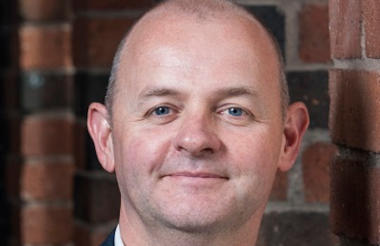Groundwork UK had just agreed a new strategy as the scale of the coronavirus crisis became clear, but the last few weeks have reaffirmed its ambitions.
Chief executive Graham Duxbury speaks energetically about how the charity is making sure it will be in the best shape possible to pick up the pieces in the coming months.
Lockdown measures are having a significant impact on Groundwork's day-to-day delivery right now, with up to a quarter of its income at risk, but the federation' members are developing innovative ways of delivering which should not need to be confined to the crisis.
However, Duxbury is also reflecting on the wider environment in which the charity works, such as the perception of the charity sector held by decision-makers, and the need for reform to public sector contracting.
‘Fighting from a corner’
Duxbury says that one of his key reflections from the past few weeks is about the perception of charities, following discussions “about the position of the voluntary sector”.
“I’ve been full of admiration and gratitude for those who have been fighting our corner in the interactions with government and so on,” he says. “But you come to a realisation, at times, that in some people’s minds we are in that corner.”
That concept of charities being in a “corner” is a problem, he believes, because the sector is “integral” to delivering in many areas, such as health and social care or the environment. As such, it should be around the table discussing broader issues, not just specific charity issues.
“In many areas we need to work towards having stronger voluntary sector voices around some of those mainstream tables,” he says.
“We do bring that different, distinctive contribution to those conversations and we need to make sure that people making decisions about those sectors understand that distinctiveness.”
‘Understand where our place is in this’
Groundwork UK is the national body that oversees a federation of local trusts. Those trusts provide a range of community activities that includes supporting young people, environmental protection, and employment and training programmes.
Groundwork is not the kind of charity where there was an immediate surge in demand. However, it expects that its services and support will be ever more needed as the country returns to some form of normality, with people in worse physical and mental health and increased unemployment.
He says: “One of the bits of learning that is coming out for me is that we need to understand where we best add value into this wider ecosystem supporting communities at the time of crisis.”
Charities need to “understand how we add our distinctive insight, expertise and capacity”, he adds. This will ensure they are "genuinely adding value into the mix”.
He adds that this crisis has shown that everyone involved, whether from public, private or charitable sectors, has been capable of acting quickly and in partnership, “utilising the distinctive attributes that we’ve all got in this space”.
Coronavirus reaffirmed the strategy
When the coronavirus crisis took hold, it was natural for Duxbury to look again at Groundwork's recently-agreed strategy. “Obviously the first thing you do is take a step back and think, well do we need to tear that plan up and start again?”
However, he realised that actually the current challenges reaffirmed the overall mission.
“Our tactics in the short term will need to change, in terms of where the money comes from and how we position ourselves, but the long-term vision is absolutely the same as it would have been before the crisis,” he says.
Groundwork's strategy focuses on mobilising practical community activity and the environment.
“We see those as being absolutely crucial to the recovery conversation in lots of different ways.
“Practical community action has been absolutely at the heart of the relief and response effort, and we need to keep hold of that and not let it dissipate. We need to support the infrastructure that can grow and sustain that.”
When it comes to the environment, those who have been worst hit by the crisis are also those with less access to green spaces.
“The crisis has demonstrated how unequal access is to the natural restorative benefits to be gained from outdoor spaces,” he says.
“Assuming we’re plunged back into an era of semi, if not full-on, austerity, how do we make sure that the investment in that part of our civil infrastructure is realised in a way which enables and encourages people who weren’t benefiting from it previously, and who really obviously weren’t benefiting form it during the crisis?”
Impact on the Groundwork network
Around a third of the federation's work has continued as planned or has been repurposed to support immediate relief efforts, he says.
This involves work supporting volunteering in local communities and distributing grants.
“That’s been a big chunk,” he says. “It’s actually got busier.”
One example is Groundwork UK's work with the supermarket Tesco to distribute money raised through reusable plastic bags.
“There was a very rapid repurposing of that programme and of that money to make sure it was being channelled into smaller organisations and charities on the frontline,” he says.
Another third of Groundwork's activities, particularly its work with young people, has transitioned into a virtual environment.
“It has been properly disrupted, but can continue through adapted means,” Duxbury says.
Examples include making use of social media to continue mentoring or setting up virtual youth groups.
He adds: “We do some work to support people in isolation and vulnerability and fuel poverty, and again that’s able to continue through remote contact.”
The final third of Groundwork's activities is on hold. It’s simply impossible to go into schools to deliver outdoor activities at the moment.
Up to 25% of income ‘at risk’
Naturally, Duxbury is anticipating that there will be a negative impact on the charity's finances.
“We’re all at the starting point of understanding what the financial impact of this might be,” he says, adding that “most of the assumptions we’re making will prove to be wrong, because there’s some stuff about the future that is genuinely unknown”.
With that caveat, he puts 20-25% of the federation’s income “at risk”. This is due to income generating activity not taking place and an expected reduction in some kinds of service delivery that operate on a payment-by-results basis.
“We’ll have a dent in our cash reserves and we’ll have a dent in our capacity and capability,” he admits. “But we can see a way through this and we’re definitely focused on being as strong as we can in that recovery phase.”
A programme over the past three years to consolidate structures and share services has already helped to make the federation “stronger and more efficient”, he says.
Furthermore, additional support and funding from government and others “has been instrumental in keeping things flowing”.
Across the federation, 500 out of 1,250 people have been furloughed, something Duxbury says has “undoubtedly been a lifeline”.
However, like many others in the sector, he feels the Coronavirus Job Retention Scheme could have gone further.
“I still fail to understand why it’s been impossible to deliver that scheme on the basis of it being a wage subsidy for people in certain roles, as opposed to payments to stay at home,” he says. “I recognise that there are challenges and limitations around fraud, but I’m sure it’s not beyond the wit of clever officials to figure that out.”
As the scheme is wound down, his plea to government is to acknowledge the “range of different business models” in charities, with mixed income sources.
There are fears, he says, that as support is phased out, there will be “just a blanket approach”.
Rebalancing the contracting relationship
Duxbury is disappointed by some public sector commissioners that have “put a few hurdles in the way that don’t need to be there”, though he emphasises that not all do so.
These additional barriers include making it difficult to access support, with “eligibility hoops that you have to jump through to qualify for support”.
It also includes a lack of understanding that the “practicalities of delivery have fundamentally changed”.
He argues that all contractual payments terms should be reviewed.
“One of the things we need to reset in this is the balance of risk attached to publicly commissioned service delivery,” he explains.
When charities are involved in supply chains, they are often working with those worst affected by the crisis, making it harder to achieve the positive outcomes required under payment-by-results contracts.
“It’s just going to take longer; it’s going to be harder in a post Covid-19 scenario,” he says. “Unless contracting regimes and payment terms recognise that, and reflect that, then the ability of organisations like ours to be part of that solution will be jeopardised.”
Assuming the government responds to a rise in unemployment with new programmes to help people find work, Duxbury says they must do so in a fair way.
“If that’s all commissioned in the usual payment-by-results frame of mind then that’s just not going to be appropriate for the circumstances we find ourselves in; both in terms of the needs of people that need support, and in terms of the ability and capacity and cash flow capability of the organisations that can be part of the solution.”
Being ‘one removed’ from the frontline
Duxbury is full of praise for staff and volunteers throughout the federation for their imagination and flexibility during a difficult time, who are “flat out busy running programmes”.
As is common right now, he is working from home and that means he is “one removed” from the day-to-day.
“I wasn’t going to add the most value trying to roll up my sleeves and get out on the frontline or from interfering,” he says.
Instead his role has been about “joining the dots” and thinking about the future.
“It’s all rapidly moving, but someone needs to have an overview,” he says. “Some of the things that have been preoccupying me are about how we keep hold of the innovation in delivery and management that we’re witnessing at the moment, and how that becomes part of the way we do things in the future.
He adds: “It’s easy to feel guilty that you’re not right at the sharp edge when you’re in this kind of position, but you’ve got to recognise that your job is to think three to six months down the line and beyond.”
Related articles













